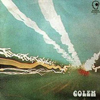 Golem is widely regarded to be a lost psychedelic masterpiece among the sorts of people who are interested in such things, numbering David Tibet, Stephen Stapleton, and Julian Cope among its more outspoken champions.  In fact, Current 93 even covered "May Rain" on Thunder Perfect Mind.  Now, 36 years after it initially appeared, Golem has finally been reissued for the first time in its original form (though it previously surfaced as part of Durtro's Ultrasonic Seraphim retrospective in 1996). I don't think I'd quite call it a masterpiece myself, but it is definitely one of the more memorably bizarre albums to emerge from the krautrock milieu and that is certainly no small feat.
Golem is widely regarded to be a lost psychedelic masterpiece among the sorts of people who are interested in such things, numbering David Tibet, Stephen Stapleton, and Julian Cope among its more outspoken champions.  In fact, Current 93 even covered "May Rain" on Thunder Perfect Mind.  Now, 36 years after it initially appeared, Golem has finally been reissued for the first time in its original form (though it previously surfaced as part of Durtro's Ultrasonic Seraphim retrospective in 1996). I don't think I'd quite call it a masterpiece myself, but it is definitely one of the more memorably bizarre albums to emerge from the krautrock milieu and that is certainly no small feat.
Rotorelief/Delta-Acustic
Rotorelief's enthusiasm for this reissue borders on the unsettling, as they are celebrating its release with related releases by both Current 93 and Nurse With Wound, as well as promising a series of five new Sand albums.  I am having a difficult time wrapping my mind around that last part, as Golem was the band’s first and only record: they broke up soon after it was released and quickly moved onto other projects.  Also of note, the band themselves saw Golem as a bit of disappointment. Adding further to my incredulity is the fact that Sand’s total recorded output to date is exactly six songs, some of which were stragglers from the trio's previous band Part of Time.  However, the Rotorelief website also describes the Current 93 When the May Rain Comes single as an "album," so I guess I have absolutely no idea what to expect.
Curiously, both the cause of Sand's dissatisfaction with Golem and one of the primary reasons for its semi-legendary status share an identical root: producer Klaus Schulze. At the time, Schulze and engineer Manfred Schunke were developing a proto-surround sound recording technique called Artificial Head Stereo Sound and this was one of the first albums to make use of the new technology (and the only one that is still remembered today).  On the downside, the technique apparently compromised the music's dynamics, much to Sand's lasting chagrin.  However, the upside is that Golem sounds crazily vibrant and hallucinatory on headphones and whatever dynamic disasters befell the album are probably unnoticeable to anyone who was not in the band.  I have to side with Klaus on this one.
While the production is definitely a key element to the album's appeal, Sand were also pretty weird in their own right.  For one thing, only two of the three band members (the Papenburg brothers) were "serious" musicians, as the band became Sand after Part of Time's organist and drummer quit.  As such, these songs generally have a very skeletal and oft-dirgelike structure, often just a bass and a synthesizer, or a bass and a guitar.  Despite his lack of instrumental prowess, however, vocalist Johann Vester was the band's resident visionary, contributing both tripped-out atmospheric synth burbling and whooshing as well as some very impressively weird and evocative lyrics (a feat made more impressive by the fact that he was a German singing in English).
It is easy to hear why this appealed to David Tibet so much when he found it in Stephen Stapleton's record collection that fateful day, as Vester seems something like a mad prophet ranting poetically though a gurgling, panning, swooping, and flanging haze.  In fact, it even seems like some moments on this album may have had a direct influence on what Current 93 eventually became, like the moment in "Helicopter" where Johannes portentously sings "And the air is dark and strange and cold…it's moving there," which triggered a flicker of "All the Stars Are Dead Now" in my mind.  At the very least, Golem certainly falls awkwardly into the pantheon of apocalyptic folk that predated Current 93's eventual perfection of the form.
The biggest downside to Golem for me is that Johannes Vester is a rather unique vocalist, to put it politely.  I think he sounds a lot like an agitated leprechaun at times during "Helicopter," but Julian Cope has more insightfully described his unique aesthetic as "post-apocalyptic space-cockney."  My other problem is the song "On the Corner," which clumsily wrecks the lysergic gnomes-and-ghosts-and-dark-forests vibe of the album with some utterly baffling hippified blues rock and over-exuberant conga playing from Schulze.  Even the lyrics are mundane—I don’t get it at all. Also, I think the Current 93 version of May Rain hopelessly eclipses the original, but I suppose that is an inherent hazard in letting David Tibet cover one of your songs. However, none of those grievances change the fact that this was (and is) a deeply aberrant and unique record:  Golem is the sound of cutting edge analog mindfuckery circa 1974 and no one else has quite made anything like it.  I can't call the experiment a complete success by any means, but "batshit crazy, but flawed" still trumps most other music in my book.
(The Rotorelief reissue has slightly different (Babs Santini!) cover art than that pictured, but not much different.  It merely looks less grainy.)
 
Read More

